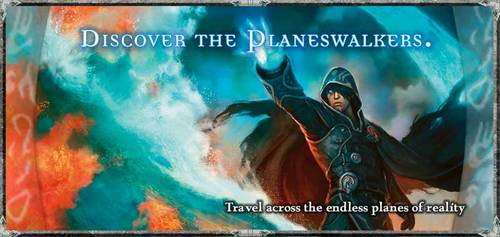Category Archives: Guest Bloggers
First, I'd like to say thanks to Jason McIntosh, Kevin Jackson-Mead, and Andrew Plotkin for the opportunity to write this series; it's been extremely useful to have a forum for clarifying my own ideas on magic systems. I'd also like to thank everyone who read and commented on each blog entry. Your feedback has been very helpful, often bringing new games to my attention as well as offering helpful insights into existing games and concepts. When Jason and Kevin first mentioned the idea of guest-blogging on the Gameshelf, we agreed that a limited duration of a couple months made the most sense, in part so that other guest bloggers can carry forward the mission of the Gameshelf in many exciting ways.
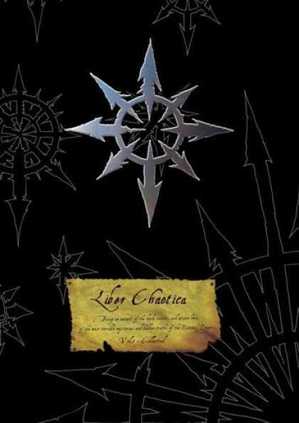
And, while in one sense I'm wrapping up this particular series, I feel more like radiating outward in many directions, because the opportunity to write here has inspired so many ideas for further exploration. Magic is an explosive nexus that doesn't react well to being contained or bottled up. It's best to answer the question: where next? And the inevitable answer is: many directions. This installment is written under the aspect of the sign of chaos (as invented by fantasy writer Michael Moorcock and adopted equally in games like Warhammer 40k and Peter Carroll's occultist movement Chaos Magick). In its positive sense, chaos is a signpost pointing toward a multitude of possible paths, liberating creative energy rather than confining it.
As far as my own creative work goes, I'll be posting a new video of my Arcana Manor interface on Youtube soon, since I now have working code in the form of drag and drop elements of spell grammar feed into array, as well as a function for matching the changing contents of this array with a database of spells. Using GlovePie, I now have keyboard input controlled by voice, as well as drawing input via the Grafitti bitmap drawing library in Actionscript 3.0. I'm currently working with mouse gesture recognition libraries in order to allow drawing gestures to be fed to the array, thereby making drawing a fully integrated aspect of the interface.
Tags: games, magic, magic systems, magick, transmedia, video games.
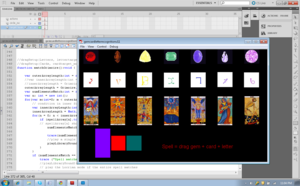
Since this blog series is called "Magick Systems in Theory and Practice," I feel that I should talk about my own practice in terms of concrete design of magic systems. For the past year and a half or so, I've been working on a project tentatively (and perhaps temporarily) titled Arcana Manor.
For the sake of consistency, I'll reproduce some of the most recent design document, starting with the game's elevator pitch.
"In Arcana Manor, the player wields a uniquely immersive and symbolic magic system to defeat the demons of a surreal Gothic mansion and unlock its secrets. Arcana Manor is a ceremonial magick simulator with an elaborate system of gestural sigils, incantations, colors, and sounds that makes players feel like true adepts, not mere button-pushers.
The magic system has these overall goals:
• to let players feel like they are the ones casting the spells rather than watching a character cast them
• to allow players to express and re-configure symbolic ideas differently in order to warp and alter reality, i.e. the system changes and adapts to different players' behaviors and personalities
• to be learnable, in part, through experimentation and trial-and-error so that there will be mystery surrounding the system; while the system is rigorously rule-based, a part of magic should remain magical in the sense of unpredictable, hidden, and knowable only through direct experience.
The conceptual framework of the magic system is based on ideas derived from authentic mystical and occult lore, in which magic is a metaphor for the power of the creative imagination.
• Players cast spells through their mastery of arcane knowledge and the symbolic correspondences of ritual
Aleister Crowley, Liber 777: 'There is a certain natural connexion between certain letters, words, numbers, gestures, shapes, perfumes and so on, so that any idea or (as we might call it) "spirit", may be composed or called forth by the use of those things which are harmonious with it, and express particular parts of its nature.'"
Tags: actionscript, arcana manor, flash games, games, magic, magic systems, magick, torque, unreal engine, video games.
A magic system is the sum total of its mechanics, interface, visual art, audio, narrative, and mythology, because a game is defined by its experience and experience consists in all of these components. Since a magic system simulates the alteration of reality by the will through the agency of metaphysical forces, all of the components of a magic system (such as visuals and audio) should ideally be pervaded by the metaphysics that the system is designed to simulate. Yet, a magic system that pushes its metaphysics to the peripheries of its art style and narrative is taking the easy way out, with the result that hardcore players will tend to ignore what they regard as mere flavor and fluff in favor of the mechanics through which they can gain concrete strategic advantage. A designer who aims to enrich her magic system through the introduction of metaphysical profundity will want to unify metaphysics and mechanics so that the understanding of esoteric concepts will improve a given player's ability to succeed in the game. Then, the hardcore gamers will tend to have the greatest, deepest grasp of the game's metaphysics because they stand to benefit most from such a comprehension.
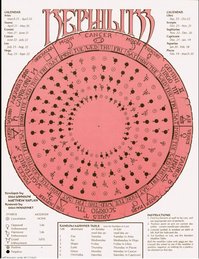
How, then, could mechanics and metaphysics be intertwined? The conjunction between the rules and affordance of a game with its philosophical implications can sometimes best be observed in non-digital games, in which the skeleton of mechanics tend to be unobscured by moving graphics and sound. One example of intertwined metaphysics and mechanics is *Nephilim*, the French game of "occult roleplaying" alluded to in last week's blog entry.
Among *Nephilim*'s many interesting mechanics is a modifier that changes the effect of a given spell according to the astrological signs associated with hours and days of the week as they interact with various elemental correspondences. The system is sufficiently complex that a Game Master's Veil (i.e. screen) includes a pentagram-shaped dial with windows that can be placed over a complex astrological table in order to calculate the modifier every time that a spell is cast. The astrological modifier and its expression through a concrete tool of turn-by-turn gameplay is one example of a metaphysical system of celestial influence and its conjunction with a game mechanic.
Tags: dragonlance, enochian chess, games, glass bead game, krynn, magic, magic systems, magick, nephilim, video games.
This week's blog entry is about magic systems and metaphysics--a topic which is to some extent a natural extension of last week's discussion of magic and horror, which introduced the representation of the supernatural as a defining trait of magic systems. This week's entry actually proceeds out of two coincidental occurrences: one is that I've been playing Magic: The Gathering [1993], Richard Garfield's famed collectible card game about dueling magicians, at lunch. This week I also happened to check out the web site for the game, where I was surprised to find text with a certain amount of metaphysical profundity and beauty.
The current expansion of Magic: The Gathering continues to develop the theme of Planeswalkers. In the mythos of Magic, each player is a Planeswalker, a dimension-hopping magician who duels with other mages by casting spells and summoning creatures. Planeswalkers are also a card type that functions somewhat similarly to an extra player or ally, with the ability to cast spells and summon creatures in addition to those cast or summoned by the player.
The website's description of a Planeswalker is quite striking and poetic, as in this excerpt:
a planeswalker's life is consumed with the exploration of the Multiverse, the discovery of strange secrets and experiences, and the plumbing of the depths of one's own mystic soul. The life of a planeswalker is a life of choice and self-determination, unrestricted by the boundaries of world or fate. With the freedom to travel and the power of magic, each planeswalker has the power to carve his or her name on the face of history
This description compellingly evokes the life of an adept and an initiate, guided by a triad of mastery, enlightenment, and imaginative travel. The devotion to an exploration of the multiverse echoes long-standing esoteric drive toward astral travel, fueled by an ethos of imaginative exploration that would render the Planeswalker a "mental traveler," in the words of William Blake. Moreover, this flavor text conjoins metaphysical ideas about astral travel with a metaphor for the lifestyle of a hardcore gamer, conceived of as existentially free and engaged with a number of different worlds rather than the single consensual reality of real life (or "RL"). Moreover, the trope of the Planeswalker takes its place within a larger cosmology involving the possession of an inner spiritual "spark" and its awakening through epiphanic enlightenment, often triggered by trauma. This imagery is based on certain strands of Gnostic belief, as described in Hans Jonas' classic Gnostic Religion and scattered throughout popular culture, including the novels of Philip K. Dick and the comic books of Alan Moore.
The strongest magic systems are those that can accommodate a simulation of metaphysics overlaps with and reinforces similar fictions. Continuing with my definitional iterations and revisions, a magic system can now be defined as a set of rules and symbols designed to simulate the alteration of reality by the exertion of the will operating through the agency of a metaphysical force. So what is metaphysics? By definition, that which is beyond the physical. This word is more accurate and inclusive than the similarly-charged term supernatural; metaphysical acknowledges nature-oriented magic (druidism, Wicca, the green side of the color pie) without being restricted to it (since playing with only green mana or druids would result in monotony and a lack of balance).
Is metaphysics just the story surrounding magic in a given game world, its lore? No. Metaphysics is the experience of magic, expressed through its mechanics, visual art, audio, interface, and control scheme. Those magic systems are strongest which can accommodate the richest, most mysterious, interactive experience of metaphysics.
The relationship between magic systems and horror is hidden and unexplored territory, as secret as the black arts that lurk within the games themselves. Horror as used here refers not strictly to the genre of survival horror, which is a marketing construct invented in association with the first Resident Evil. Rather, horror-themed games include any game whose purpose is to evoke a sense of fear, dread, and the sublimity of unknown dark forces. Horror-themed games can be first person shooters, action-adventure games, and side-scrolling beat 'em ups. Magic is rarely the core mechanic of horror-themed games, often because players are put in the position of fighting magic through firearms and melee, or using magic only indirectly through artifacts. Magic and horror are intimately wedded in terms of themes but not in terms of direct player interaction.
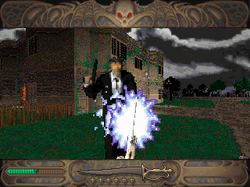 Yet, horror games often have the most original and memorable simulations of magic in terms of atmosphere and mood. What horror games have to teach us is their atmospheric simulation of magic, the Gothic mood that they associate with magic through a combination of art style, audio, and (sometimes) haptics. If more closely melded with the core mechanics of games, magic systems in horror games can be superb examples of design and provide inspiration for other hybrid genres.
Yet, horror games often have the most original and memorable simulations of magic in terms of atmosphere and mood. What horror games have to teach us is their atmospheric simulation of magic, the Gothic mood that they associate with magic through a combination of art style, audio, and (sometimes) haptics. If more closely melded with the core mechanics of games, magic systems in horror games can be superb examples of design and provide inspiration for other hybrid genres.
Magic appears prominently in horror games because of an endemic thematic preoccupation with the supernatural, with emphasis on its dark side as the infernal and the demonic. With this supernatural element in mind, the definition of magic systems can be further refined and extended from last week's blog entry. A magic system is a set of rules and symbols for rigorously simulating the alteration of reality through the will by the agency of a supernatural force, whether conceived of as a genuine metaphysical presence, a symbolic construct, or an energizing psychological reality. In keeping with Crowley's axiom from Magick and Theory and Practice that "any intentional act is a magical act," any act of gameplay requires the operation of the will to achieve a desired result in altering a symbolic reality; therefore, any game mechanic can potentially be looked at as magic. This definition could theoretically be extended to include snowboarding and guitar playing if the experience of these activities approached the transcendent (which according to some Rock Band devotees, it certainly does). However, those genres that most embrace the representation and simulation of the supernatural will tend to exhibit interrelated mechanics that can most rigorously be defined as magic systems.
The definition of a magic system introduced in installment one could be sharpened from "any set of rules designed to simulate supernatural powers and abilities" to "any set of rules and symbols designed to simulate the alteration of reality through the will." This definition echoes Crowley's first axiom from Magick in Theory and Practice ("magic is the science and art of causing change to occur in conformity with will"), though it can apply to games without requiring designers to buy into any particular philosophical scheme. Rather, an appreciation of magic requires only a little reflection on the profound mystery of the will: by deciding to do something, we can make it happen. For example, we focus our will to pick up a glass of water at lunch, and we do pick it up. Magic is an extension of similar taken-for-granted acts of will into a more profound longing: to control not just our immediate surroundings through the direct use of our body, but to shape nature, technology, other human beings, and the spirit world through the force of the will.
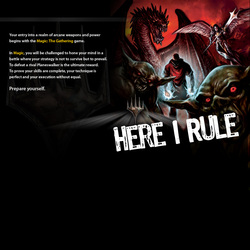 Perhaps most specifically, the fascination with magic stems from a desire to guide and shape the forces that govern the course of our individual human lives. The exercise of will to create change in life is murky and difficult, thwarted as it often is by forces both internal and external beyond our control. But in games, there is the potential of mastery, of understanding rules and then manipulating them through strategy in order to achieve a desired outcome. "Here I rule" is the marketing slogan of Magic: The Gathering, a declaration often accompanied by depictions of a skinny adolescent smirking confidently while surrounded by the fearsome monsters. As gamers, many of us identify with that sentiment.
Perhaps most specifically, the fascination with magic stems from a desire to guide and shape the forces that govern the course of our individual human lives. The exercise of will to create change in life is murky and difficult, thwarted as it often is by forces both internal and external beyond our control. But in games, there is the potential of mastery, of understanding rules and then manipulating them through strategy in order to achieve a desired outcome. "Here I rule" is the marketing slogan of Magic: The Gathering, a declaration often accompanied by depictions of a skinny adolescent smirking confidently while surrounded by the fearsome monsters. As gamers, many of us identify with that sentiment.
As magic systems in games evolve, various forms of alteration of reality become formalized into types or "schools" of magic to categorize the ways in which players can alter a simulated reality.
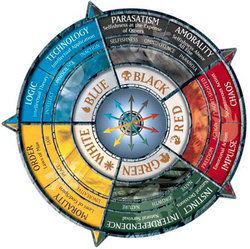
Gestural input is to some extent inherent in the language of magic, as seen in the phrases to "cast a spell" and to "weave an enchantment." The fantasy of weaving magic can be vividly seen on the cover of LucasArt's Loom (1990), in which two hands weave a glowing cat's cradle out of multi-colored light. (While Loom lacked any kind of gestural interface, its unique mode of musical spellcasting and melodic feedback will figure heavily into a later blog entry on multimodal feedback and audio magic.) Gesture is also an integral part of occultist approaches to magic, ranging from the pentagrams and hexagrams traced in the rituals of the Golden Dawn and Thelemic magick, the sigils drawn by Austin Osman Spare and Buddhist kuji-in mudras later adapted in the ninja-themed anime series Naruto.
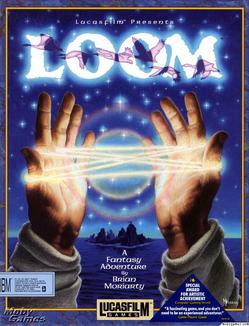
Closely related to the idea of gestural magic is the verbal component of spell-casting, which appears in colloquial speech as a magic word. From David Copperfield to Harry Potter and the 2010 Sorcerer's Apprentice remake, the image of a wizard waving a wand and intoning a word in order to release a powerful magic spell pervades public consciousness of enchantment. Magic words are a direct extension of the arcane grammars that govern ritual and the combinatorial systems of runic languages discussed in the first installment of this blog series. Voice recognition software, now a standard part of Windows and readily available in more precise programs such as Dragon NaturallySpeaking, could heighten the immersive possibilities of incantation as a spellcasting method.
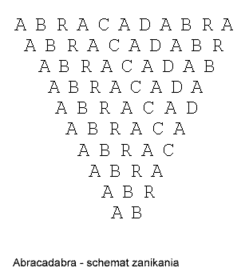 Gestural input, in which players use a variety of input devices to trace symbols or fashion other secret signs with hands and body, is also especially relevant from a technological perspective after the 2010 E3 unveiling of Microsoft's Kinect (formerly project Natal) and the Playstation Move. These devices offer new levels of motion sensing technology, in addition to existing alternative input methods in the Wiimote and Wiimotion Plus, the Playstation Eye, and the force-feedback controls offered by the Novint Falcon. Each technology could be leveraged for new methods of casting spells, provided that designers can break out of the prevailing tray-of-icons approach to magic represented in many popular RPG's.
Gestural input, in which players use a variety of input devices to trace symbols or fashion other secret signs with hands and body, is also especially relevant from a technological perspective after the 2010 E3 unveiling of Microsoft's Kinect (formerly project Natal) and the Playstation Move. These devices offer new levels of motion sensing technology, in addition to existing alternative input methods in the Wiimote and Wiimotion Plus, the Playstation Eye, and the force-feedback controls offered by the Novint Falcon. Each technology could be leveraged for new methods of casting spells, provided that designers can break out of the prevailing tray-of-icons approach to magic represented in many popular RPG's.
Envisioning the most creative use of new gestural and verbal technologies requires, paradoxically, an enterprise of game archeology, looking back into the history of games with magic in a search for hidden gems of unusual interfaces and input methods. Retro gaming and scholarship of retro games can offer a perspective on magic systems before they hardened into a single mold and became homogenized by marketing and ease of use or implementation.
I am pleased to introduce Jeff Howard, The Gameshelf’s first guest blogger.
Jeff is Assistant Professor of Game Development and Design at Dakota State University in Madison, South Dakota. He is the author of Quests: Design, Theory, and History in Games and Narratives. He received his B.A. from the University of Tulsa and his M.A. and Ph.D. from the University of Texas at Austin. He is currently working on a game-in-progress, Arcana Manor, and related research about magic systems.
He plans on writing about games and magic over the next couple of months here, starting with this post. Enjoy! —jmac
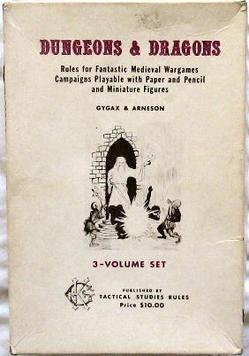
A magic system is any set of symbols and rules designed to rigorously simulate supernatural powers and abilities. Magic is pervasive as a game mechanic and fictional construct within games, spanning across genres (RPG, MMORPG, adventure game, action-adventure, fighter, survival horror) and decades (from the 1974 first edition of Dungeons and Dragons to World of Warcraft and beyond).
Magic is part of the very nature of why people play games: to simulate abilities that they do not possess in real life; to escape from the prison of the mundane to the realm of enchanted; to weave the chaotic forces of life into a rule-bound system that can be understood and, at least partially, controlled.
The problem is that many magic systems aren’t very magical. RPG’s, both multiplayer and single player, have the same shortcoming: players press a button on a tray of icons, then watch an animation fire, followed by a cooldown period, after which players press the same button again. This process of spamming a hotkey button or two, cued to one’s most powerful spells, doesn’t feel like magic.
Magic, as depicted in fantasy literature and occult tradition alike, is a complex and arcane art comprised of gestures and words, as well as ingredients carefully combined with ritualistic artifacts in order to draw away the veil between the natural and supernatural worlds. So, the question emerges: how could designers put the magic back into magic systems?

